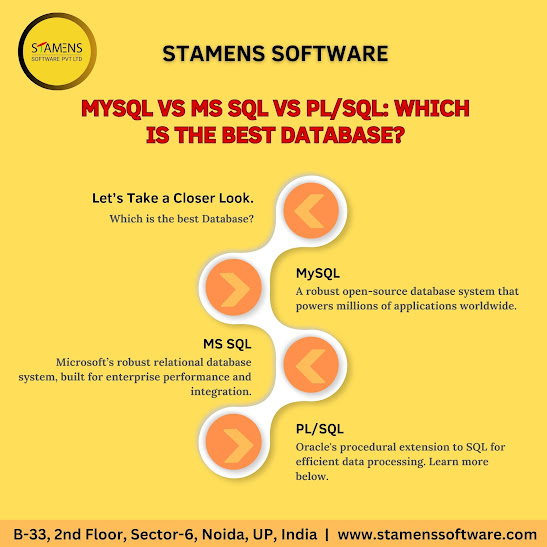MySQL vs MS SQL vs PL/SQL: Which is the Best Database?
In this article, we will explore different relational database management systems (RDBMS) and provide a comparative analysis. Relational databases are widely used in modern applications due to their efficiency in handling complex queries and large datasets, allowing businesses to store data in an organized manner across multiple tables.
Relational databases have become the standard for data management, replacing older database models such as flat files and hierarchical databases. Their structure, based on tables with rows and columns, facilitates easy data retrieval and manipulation, making them essential for a wide range of IT projects.
All RDBMS utilize Structured Query Language (SQL) for querying and managing data, but the specific implementations and features can vary significantly between different systems. Let's dive into a comparison of three popular RDBMS: MySQL, Microsoft SQL Server (MSSQL), and PL/SQL.
MySQL
MySQL is an open-source RDBMS developed by MySQL AB, now owned by Oracle. It is known for its speed, reliability, and flexibility.
- Primary Database Model: Relational DBMS
- Secondary Database Models: Document Store, Spatial DBMS
- Developer: Oracle
- DB Engines Ranking: #2 in Overall, #2 in Relational DBMS
- Initial Release: 1995
- License: Open Source
- Current Release: 8.0.27 (October 2021)
MySQL is particularly favored for web applications, especially those built using PHP. Its ease of use and extensive community support make it a popular choice for startups and small to medium-sized businesses.
Microsoft SQL Server (MSSQL)
MSSQL is a proprietary RDBMS developed by Microsoft, designed primarily for enterprise-level applications.
- Primary Database Model: Relational DBMS
- Secondary Database Models: Document Store, Graph DBMS, Spatial DBMS
- Developer: Microsoft
- DB Engines Ranking: #3 in Overall, #3 in Relational DBMS
- Initial Release: 1989
- License: Proprietary Software
- Current Release: SQL Server (November 2019)
MSSQL excels in integration with other Microsoft products, making it a go-to for businesses already invested in the Microsoft ecosystem. It supports complex queries and robust transaction controls, providing reliable performance for mission-critical applications.
PL/SQL
PL/SQL, developed by Oracle, is a procedural extension for SQL that combines SQL’s data manipulation capabilities with the procedural features of programming languages.
- Primary Database Model: Relational DBMS
- Secondary Database Models: Document Store, Graph DBMS, RDF Store, Spatial DBMS
- Developer: Oracle
- DB Engines Ranking: #1 in Overall, #1 in Relational DBMS
- Initial Release: 1980
- License: Commercial
- Current Release: 19c (February 2019)
PL/SQL is particularly strong in data processing applications where performance and error handling are critical. Its procedural nature allows developers to write complex logic directly within the database, improving efficiency for data-heavy applications.
Common Features Across MySQL, MSSQL, and PL/SQL
Tables
All three databases utilize a tabular structure for data storage, using rows and columns to organize information.
Foreign Keys
Each platform employs foreign keys to create relationships between tables, facilitating data integrity and relational logic.
High Performance
Each RDBMS can efficiently handle data storage and retrieval, ensuring high performance for applications regardless of the underlying infrastructure.
Scalability
All three systems can scale to meet the needs of both small and large projects, capable of managing millions of transactions daily.
Key Differences
While MySQL and MSSQL are both popular choices for enterprise applications, there are notable differences in their architecture and features.
Transaction Control
In MSSQL, transactions are executed in a way that allows for commenting and error handling, but rolling back failed transactions can be more complex compared to MySQL.
Native Compatibility
MySQL is versatile, running on various operating systems such as Linux, macOS, and Windows. MSSQL was initially Windows-only but has expanded to Linux. However, it may lack some features on non-Windows platforms.
Language Support
MySQL supports a broader range of programming languages including PHP, Ruby, and Python, making it a flexible choice for diverse development environments. MSSQL primarily focuses on integration with .NET languages.
Cost Considerations
Cost can be a significant factor when choosing an RDBMS. MySQL offers a free tier, making it appealing for startups and small businesses, while MSSQL typically requires licensing fees for enterprise-level features.
Understanding SQL vs MySQL
It’s essential to clarify the distinction between SQL and MySQL. SQL (Structured Query Language) is the standard language used for managing relational databases, while MySQL is an actual database management system that uses SQL to perform various operations.
Conclusion
Choosing the right RDBMS depends on various factors, including the specific needs of your application, existing infrastructure, and budget. MySQL is an excellent choice for open-source enthusiasts and web applications, MSSQL shines in enterprise environments, and PL/SQL is ideal for complex data processing tasks.
To make an informed decision, consider engaging with a trusted vendor or consultant who can guide you based on your unique requirements. At Stamens Software, we specialize in helping businesses select and implement the right database solutions tailored to their needs. Security and disaster recovery are crucial aspects to prioritize in any database solution. All three options provide robust performance capabilities, but your specific use case will ultimately dictate the best fit for your needs. Let us partner with you to unlock the full potential of your data!




Comments
Post a Comment